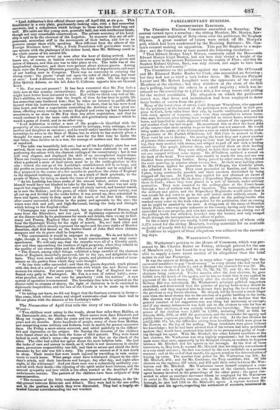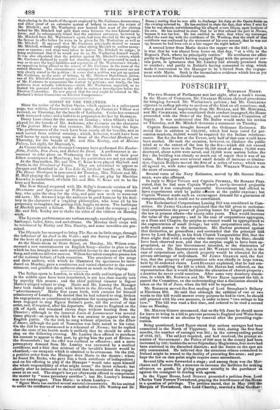PARLIAMENTARY BUSINESS.
CONTROVERTED ELECTION&
The Flintshire Election Committee assembled on Saturday. The contest turned upon a scrutiny ; the sitting Member, Mr. Mostyn, haw- ing an apparent majority of forty-three over the petitioner, Sir Stephen Glynne. A great number of voters were struck off Mr. Mostyn's poll, which had been condemned by the Revising Barrister ; Mr. Mos- tyn's counsel making no opposition. This put Sir Stephen in a majo- rity ; and the Committee at once passed the following resolution-
" That Edward Mostyn Lloyd Mostyn, commonly called the Honourable Edward Mostyn Lloyd Mostyn, had not been duly elected a knight of the shire to serve in the present Parliament for the county of Flint ; and that Sir Stephen Richard Glynne, Bart., was duly elected, and ought to have beta returned for the said county." The Committee on the petition against the return of Mr. O'Connell and Mr. Edmund Burke Roche for Cork, also assembled on Saturday; but they had not so brief a task before them. Mr. Nicholas Philpott Leader and Mr. Robert Longfield were the opponents of the sitting Members at the election ; but they withdrew at the close of the first day's polling, leaving the others in a small majority ; which was in- creased on the second day to 1,274 to 406, a few stray voters still polling for the retired candidates. The allegation on which the petitioners rested was, that force and intimidation had been employed to deter large bodies of voters from the poll— Many of the lower class of voters, (said Sergeant Wrangliam, who appeared for the petition,) in the interest of the petitioners were arrested in their pro- gress to Cork, forty miles from that city, by hostile multitudes, and assailed with every species of weapons; many were thus compelled to return home: One man, however, after having been compelled to return home, mounted his horse, and travelled by night, disguised with the colours of the opposite party, and reached Cork too late to poll. He mentioned this to show the bona j1r. of the voters—that their anxiety to go to the poll was not assumed. He would bring under the notice of the Committee a case in which fourteen voters, under the guidance of Mr. Patrick O'Sullivan, left Mill Cove to proceed to Cork. They went by sea to Bantry. On nearing the beach they saw a great number of persons there assembled. On taking to their boat for the purpose of land- ing, they were assailed with stones, and obliged to pull off and seek a landing elsewhere. The people followed theni, and received them on their landing with vollies of stones. They were obliged to fight their way to their inn, and not one escaped without some injury. Mr. O'Sullivan received a wound on the back of the head. Two voters were unable to reach the inn, and one was disabled from proceeding further. Being joined by other voters, they started the next morning, in number about twenty-five. At their next halting-place Mr. O'Sullivan applied for protection to Mr. O'Regan, the Catholic priest, who afforded it to them. They next proceeded to Bandon, and thence to Upton, being continually assailed, and their numbers diminished by being dragged off the cars. At Upton they applied for and obtained an escort of military and police, under Mr. G.Jones, a Stipendiary- Magistrate, who conveyed them to Cork ; where they were placed in a sort of barrack, under military protection. They were escorted to the polling-place at the Court-house through a lane of soldiers with fixed bayonets. The commanding-officers of the military and police, and the Stipendiary Magistrate, would prove that it was unsafe for any voter to go to the poll unless under military escort. It would also be proved, that persons were placed in the polling-booths who marked every voter on the back who polled for the petitioners, that on coming out he might be assailed by the mob. A clergyman of the name of Standish Grady Parker, who was quite unknown in the county, having only then lately succeeded to same property, and who had never voted before, on coming out of the polling-booth was attacked, knocked into the kennel, and only escaped death through the interposition of an officer of police.
In the county there are nearly 3,000 registered voters, of whom only 1,274 voted for the sitting Members, leaving materials for an available majority of nearly 800 for the petitioners. Evidence in support of these allegations was adduced on the succeed- ing days. MR. WARBURTON'S PETITION.
Mr. Warburton's petition to the House of Commons, which was pre sented by Mr. Charles Buller on Friday, although printed for the use of Members only, has found its way into the daily papers, and we are able to supply a more exact .outline of its allegations than the brief notice in our last Postscript.
It was the custom at Bridport, as in many other " open boroughs," for the successful candidate to pay " head-money " to every elector who had voted for him and who chose to claim it; and at Bridport the elector's fee was 10/. Mr. Warburton was elected iu 1826, '30, '31, '32, '34, '37, and 41; the four last elections being contested. Twelve months after the first election, he gave 2,000L into the hands of his agents, and he has no doubt that it was epplied in payment of the head-money. Shortly after the election of 1830, when the Reform Bill was introduced, Mr. Warburton's principal political supporters assembled, and determined that the practice of paying bead-mency should be abolished ; and they required him to abstain from paying the heid-money for the previous or any future election. He obeyed, but he devoted a much larger sum than the head-money due to the erection of a public building in the town. His election was always a matter of moral certainty; he declares that the general conduct of his supporters was any thing but mercenary or corrupt; and if any money inducement was held out to the electors to vote for him at the last four elections, it was entirely without his knowledge. The usual ex- penses of the election were 1,5001. to 1,700L, including 7001. or 8001. for dinners, 2001., 3001., or 400/. for processions, and the remainder for agency and public-house expenses preceding the test of the writ. At the last election ha paid-2,1681. 17s. Id., the difference arising from breakfasts which were given to the electors on the day of the polling. Those breakfasts were given without his knowledge ; but he had been advised that if his return bad been petitioned against, they would have rendered him liable to be pronounced guilty of treat- ing through his agent. With Mr. Mitchell, the other Liberal candidate at the last election, Mr. Warburton was very slightly acquainted ; but he was called upon more than once, apparently by his Bridpurt friends, to mediate in disputes between Mr. Mitchell and his agents in the borough. At the first of these interviews, in May last, he warned Mr. Mitchell that his majority was estimated at a very small amount ; the fact was tested by the new candidate in a personal canvass; and at the end of that month, his agents acted on the determination of buying up votes. The number that polled for Mr. Warburton was 304 ; for Mr. Mitchell, 282; and for Mr. Cochrane, the Tory candidate, 244. Of 594 electors on the register, 557 voted; and 272 split their votes between Mr. War- burton and Mr. Mitchell. Mr. Warburton never himself employed a com- mittee, but only a single agent : in the course of the election, however, his agent became involved in the proceedings of the other party; the agent con- sented to allow an assistant canvasser whom lie employed tor Mr. Warburton to assist in Mr. Mitchell's canvass, and, in Mr. Mitchell's absence from the borough, he also lent 1501. to Mr. Mitchell's agent. A rupture between Mr. Mitchell and his agents, respecting the settlement of accounts, terminated ha their placing in the hands of the agent employed by Mr. Cochrane, documentary and other proof of an extensive system of bribery to secure the return of Mr. Mitchell; and Mr. Warburton now learned that most of the electors bribed for Mr. Mitchell bad split their votes between the two Liberal candi- dates; and he subsequently found that the assistant canvasser, borrowed by Mr. Mitchell from Mr. Warburton's agent, bad been directed by the agents of the former to offer bribes for votes to be given for Mr. Warburton as well as Mr. Mitchell. It appeared that Mr. Cochrane principally desired to unseat Mr. Mitchell, without subjecting the other sitting Member to useless annoy- ance or expense ; and steps were taken to induce Mr. Mitchell to resign ; it being understood that if be would not do so, Mr. Warburton himself would. It was also stipulated that the petition against Mr. Mitchell's return, which Mr. Cochrane declared he would not abandon, should be prosecuted in such a way as to save the legal liabilities and reputation of Mr. Warburton's friends ; no opposition being offered to the return of Mr. Cochrane in the room of the retired Member. The circumstances subsequent to this arrangement are not very clearly stated in the petition : it seems that a petition was got up against Mr. Cochrane, on the score of bribery, by Mr. Matthew Hutchinson junior, one of Mr. Mitchell's deserted agents; some disposition was shown on the part of Mr. Cochrane to compromise the contest by petition ; and finally, the two petitions were actually withdrawn,—which Mr. Warburton regretted, as he desired his personal conduct in the affair to undergo investigation before the Election Committee. He now prayed that the case might be referred to Mr. Roebuck's Select Committee on Election Compromises.



























 Previous page
Previous page